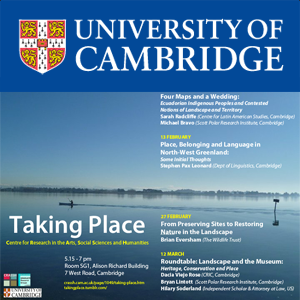Taking Place - 11 March 2013 - Challenging Conventions of Slum Upgrading: Lessons Learnt from a Study of Upgrade in South Africa
Duration: 57 mins 21 secs
Share this media item:
Embed this media item:
Embed this media item:
About this item

| Description: |
Dr Kamna Patel (Lecturer in Development Administration, The Bartlett Development Planning Unit, UCL)
Abstract The in situ upgrade of slums is widely considered global best practice in approaches to urban poverty management. This paper presents some of the findings of an investigation into the effects of in situ upgrade on conceptions of tenure security and insecurity, and practices of access to land and housing in low income settlements in Durban, South Africa. Drawing on the grounded experience and lived realities of 24 shack dwellers, and the creative uses of aspects of their identity and social relations, the paper argues the conception and execution of slum upgrading in South Africa reveals two major flaws in upgrade convention. The first flaw is that tenure security can be conceptualised in a way distinct from other securities that affect claims to property, and the second, that slum upgrade can forge a basis on which to renegotiate relations between (informal) citizens and (the formal) state. These findings have wider implications for current trends in urban poverty management. |
|---|
| Created: | 2013-03-14 11:39 |
|---|---|
| Collection: | Taking Place Seminar |
| Publisher: | University of Cambridge |
| Copyright: | Glenn Jobson |
| Language: | eng (English) |
| Keywords: | CRASSH; Taking Place; Kamna Patel; |
| Abstract: | Dr Kamna Patel (Lecturer in Development Administration, The Bartlett Development Planning Unit, UCL)
Abstract The in situ upgrade of slums is widely considered global best practice in approaches to urban poverty management. This paper presents some of the findings of an investigation into the effects of in situ upgrade on conceptions of tenure security and insecurity, and practices of access to land and housing in low income settlements in Durban, South Africa. Drawing on the grounded experience and lived realities of 24 shack dwellers, and the creative uses of aspects of their identity and social relations, the paper argues the conception and execution of slum upgrading in South Africa reveals two major flaws in upgrade convention. The first flaw is that tenure security can be conceptualised in a way distinct from other securities that affect claims to property, and the second, that slum upgrade can forge a basis on which to renegotiate relations between (informal) citizens and (the formal) state. These findings have wider implications for current trends in urban poverty management. |
|---|---|

